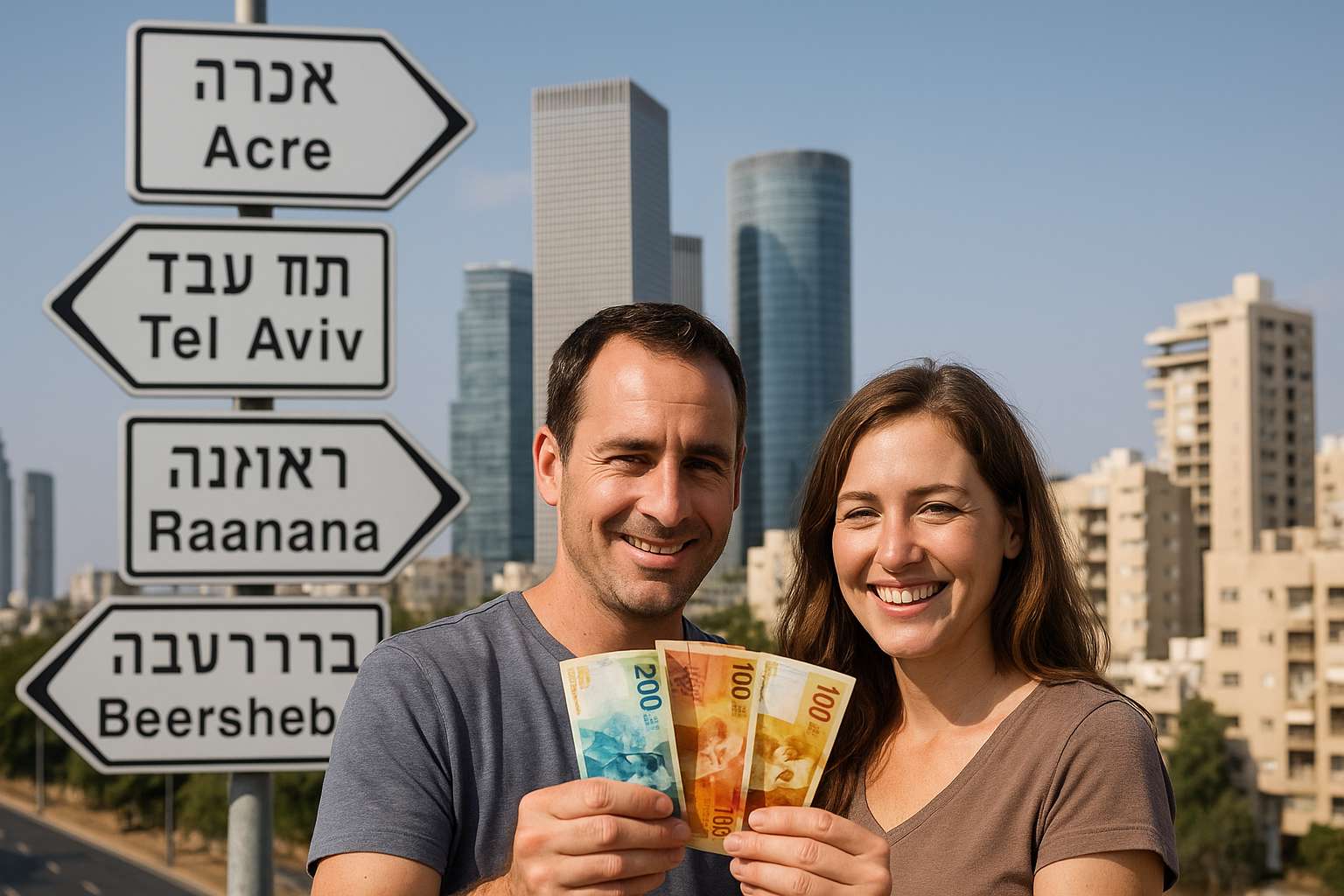In this Guide:
Can foreigners buy property in Israel? You bet. Whether you’re eyeing a Tel Aviv apartment, a Jerusalem pied-à-terre, or a beach house in Herzliya—foreign buyers are welcome. But (surprise!) the rules, fees, and paperwork are uniquely Israeli. Here's everything you need to know—no Hebrew required.
Key Takeaways
- Yes, foreigners can buy property in Israel—including homes, apartments, and commercial properties. Most restrictions apply only to land owned by the state.
- The process requires legal help, due diligence, and tax documentation. You’ll need an Israeli tax number, ID documents, and a lawyer who knows the system.
- Mortgages are possible for foreigners, but require large down payments (typically 50%) and have stricter approval conditions than for residents.
- Expect taxes, legal fees, and bureaucracy, but the payoff includes strong investment potential, emotional connection, and real estate in a booming market.
What Does It Mean for a Foreigner to Buy Property in Israel?
So, what exactly is a "foreigner" in Israeli real estate terms? It’s anyone who isn't officially a resident of Israel—whether you're living abroad or holding a tourist visa while dreaming of your second home in the Holy Land.
Here’s the deal:
- Foreigners can buy property in Israel, but not all land is treated equally.
- There are two main types of ownership:
- Freehold: Full ownership. You own the land and building.
- Leasehold: You lease land (usually from the Israel Land Authority) for up to 99 years, but own the building on it.
For example, one American oleh we spoke to thought he bought a "house and land"—until his lawyer explained he was leasing the land. Cue panic. And then relief—it's totally normal here.
Resident vs. Non-Resident Process:
- Residents get easier financing, less scrutiny.
- Non-residents often need to jump through more hoops—especially with banks.
Pro tip: Always ask: “Is this on state land?” before signing anything.
Want to dive deeper into ownership options? Check out this guide on buying property in Israel.
Why Is Buying Property in Israel as a Foreigner Important?
Let’s be real: Buying property in Israel as a foreigner isn’t just about the square footage.
For many, it’s emotional—a spiritual home base, a connection to Jewish heritage, or just a dream come true. We've met families from France who bought an apartment in Netanya just to feel “closer” to Israel every summer. Or Christian tourists who bought in Tiberias for religious pilgrimages.
Others are thinking smart:
- Real estate in Israel has historically appreciated, especially in cities like Tel Aviv and Jerusalem.
- For investors, it’s a safe haven asset in a country with limited land but huge demand.
- There can be tax advantages—especially for new immigrants or those eligible under Aliyah benefits.
Buying here isn’t just emotional—it can also be strategic.
Tip: If you're even considering making Aliyah later, owning property now may save you serious money down the road.
Can Foreigners Legally Buy Property in Israel?
Government Policy Toward Foreign Buyers
Yes, foreigners can legally buy property in Israel—but not all property. Around 93% of land is owned by the state, administered by the Israel Land Authority (ILA). Foreigners can’t always purchase land directly unless they’re Israeli citizens or eligible under the Law of Return.
Private vs. State Land
- Private land: Freely sold and owned by anyone.
- State (leasehold) land: Managed by the ILA. Foreigners often can lease but not own it outright.
Always confirm land ownership status through the Tabu (Israeli land registry). Don’t rely on what an agent tells you—it must be documented.
Land vs. Apartment Ownership
Apartments are easier. They’re often built on leasehold land, but foreigners can legally own the unit.
Leasehold Rules
The ILA requires buyers to sign long-term leases. You may need approval for resale or renovation—it's all in the fine print.
Jewish vs. Non-Jewish Buyers
Jewish foreigners may be eligible under the Law of Return, which gives easier access to land. Non-Jewish foreigners face more limitations, especially with state-owned properties.
Tip: Work with a lawyer who knows ILA regulations inside out.
What Types of Properties Can Foreigners Buy in Israel?
Foreigners can buy a wide range of property types—if they know where to look.
Available Property Types
- Apartments & Condos: Most common for foreign buyers.
- Private Homes: Especially in areas like Caesarea or Ra’anana.
- Commercial Property: Requires extra due diligence.
Agricultural vs. Residential
You usually can’t buy agricultural land unless you’re an Israeli farmer or cooperative member. Stick to residential or commercial for a smoother ride.
Restrictions on ILA Land
Leasehold properties require navigating ILA rules. Your lawyer should confirm the land’s classification before purchase.
Popular Property Types by City
- Tel Aviv: Modern apartments near Rothschild Blvd.
- Jerusalem: Old City flats or German Colony villas.
- Herzliya: Luxury beachfront homes.
Want to know where expats love to live? Check out where to live in Israel for neighborhood breakdowns.
What Is the Step-by-Step Process to Buy Property in Israel as a Foreigner?
Here’s how to do it without losing your mind—or your shekels.
1. Get Pre-Approval (If Financing)
Foreigners usually need 50% down. Try Bank Mizrahi-Tefahot or Leumi for banks that deal with non-residents.
2. Hire a Real Estate Lawyer
Non-negotiable. Contracts are in Hebrew and often hundreds of pages long—with dozens of copies to sign.
Your lawyer should explain every line, especially the penalty clauses if you can’t close the deal.
3. Due Diligence
Confirm land ownership, check zoning, permits, Arnona debts. Don’t skip this!
4. Purchase Agreement & Deposit
Typically signed within 14 days of finding the property.
You’ll pay 10% via a bank cheque. Completion is usually 3–6 months later, but everything’s negotiable—even the seller’s ficus tree. Seriously. One buyer we helped insisted on cutting down a tree. The seller agreed!
Pro tip: Always meet the seller. Exchange numbers. In Israel, this is normal—and often essential. If the seller doesn’t like you, they might just… not sell. (It happens.)
5. Land Registration
Only once it’s registered with the Tabu are you officially the owner.
What Are the Legal Requirements for Foreign Buyers?
Before you can own a single shekel’s worth of property, make sure you’re ready with:
Required Documents
- Passport (current and valid)
- Israeli tax ID number — not the same as your tourist ID. Your lawyer can help apply for one.
Reporting Obligations
You must report your purchase to Israeli tax authorities—even if you’re living abroad.
Anti-Money Laundering
Be ready to provide:
- Proof of income
- Source of funds
- Foreign bank statements
It may feel invasive, but banks are under strict scrutiny. One British buyer we helped had his transfer delayed for two weeks because he didn’t pre-authorize the wire with his bank.
Power of Attorney
If you’re overseas, grant your Israeli lawyer power of attorney to act on your behalf. It’s standard and speeds things up.
Want more help with Israeli bureaucracy? Read our guide on how to get an Israeli passport—even if you're not eligible, the process overlaps!
Can Foreigners Get a Mortgage in Israel?
Yes, but it’s not exactly a walk on Rothschild Boulevard.
Bank Practices
Most Israeli banks lend 50% or less to non-residents. They’ll want:
- Solid income documentation
- Large down payment
- A local bank account
Timelines & Terms
Approval can take 4–8 weeks and interest rates are usually higher for foreigners.
Best Banks for Foreign Mortgages
- Bank Leumi
- Bank Hapoalim
- Mizrahi Tefahot (most foreigner-friendly)
Tip: Ask if the bank rep speaks English and handles non-resident files regularly.
Use a Broker
Brokers charge about 1% of the loan, but save you weeks of stress. They negotiate with multiple banks, handle paperwork, and get you better terms.
We highly recommend First Israel Mortgages—they’ve helped many of our readers and speak fluent “Israeli bank”.
For more on financing, read our full guide to getting a mortgage in Israel.
What Taxes and Fees Do Foreign Buyers Pay in Israel?
Brace yourself—because the fees can sneak up on you.
1. Purchase Tax (Mas Rechisha)
Foreigners pay higher brackets than residents.
Rates range from 8% to 10%, depending on the property’s price and if it’s your first in Israel.
See our property tax in Israel guide for up-to-date rates.
2. Legal Fees
Expect to pay 0.5% to 1.5% of the purchase price. Some lawyers charge flat fees.
3. Agent Commission
Usually 1% to 2%, plus VAT. Remember, agents here represent sellers, not buyers—unless you hire your own.
4. VAT (Ma’am)
If buying new from a developer, 17% VAT is baked into the price. Resale? No VAT.
5. Municipal Taxes (Arnona)
Paid to your local municipality, based on square meters. Don’t forget this recurring cost!
6. Capital Gains Tax
If you sell later, expect 25% capital gains unless exemptions apply.
First-Time Buyer Perks?
They exist—but mostly for residents. New olim may qualify. See our Aliyah process guide for more on eligibility.
What Are the Common Challenges Foreigners Face When Buying?
Buying real estate in Israel can feel like decoding ancient Hebrew scrolls—except there’s more paperwork.
1. Language & Legal Differences
Most contracts are in Hebrew, and Israeli legal culture assumes “buyer beware.” Always hire your own real estate lawyer—this isn’t the U.S.
2. Bureaucracy & Timelines
Things move slow. Really slow. One Canadian buyer waited 5 weeks for a Tabu update… on a single word.
3. Real Estate Agents
Israeli agents represent sellers. If you want someone in your corner, hire a buyer’s agent.
4. Bank Transfers
Wiring funds internationally? Confirm your bank’s daily limits and notify them early.
5. Personal Fit
One buyer from Belgium was turned down after making an offer because the seller “didn’t feel a connection.” Always meet the seller—relationship matters here.
For more on navigating Israeli quirks, visit our guide to life in Israel.
What Are the Benefits of Buying Real Estate in Israel as a Foreigner?
Israel’s real estate market isn’t just hot—it’s a desert mirage with WiFi and granite countertops.
Capital Stability
Property values in Israel—especially in cities like Tel Aviv and Jerusalem—have remained strong, even in global downturns. It’s a hedge against inflation and global instability.
Emotional Ties
For many Jewish buyers, it's more than investment. It’s connection. One NYC family told us, “We didn’t buy a vacation home—we bought peace of mind.”
Rental Income Potential
- Short-term rentals in Tel Aviv and Jerusalem are booming.
- Long-term leases in student-heavy areas like Haifa offer stable returns.
Long-Term Investment
Limited land + high demand = price growth. Even modest apartments are appreciating.
Considering renting it out after buying? Read our post on investing in Israel real estate.
What Are the Best Practices When Buying Property in Israel?
Follow these rules like they’re the Ten Commandments of Israeli Real Estate:
1. Work With a Real Estate Lawyer
They’ll handle the legal side, translate everything, and protect you from nightmare clauses.
2. Use a Buyer’s Agent
Most agents represent sellers. A buyer’s agent works for you.
3. Visit the Property
Never buy sight unseen. Photos lie—and so do balconies that “have a sea view” but actually overlook a parking lot.
4. Verify Ownership
Always check the Tabu to confirm who actually owns the property.
5. Everything’s Negotiable
Price, timelines—even landscaping. Don’t like a tree? Ask for it to be removed.
Also check out our guide on sending money to Israel to prepare your transfer in advance.
How Does Inheriting or Gifting Property Work for Foreigners?
Foreigners can inherit property in Israel, but it must go through Israeli inheritance law, which may override wills made abroad. If you're gifting property to a child or relative, you must declare it to Israeli tax authorities, even if no money changes hands. There's currently no gift tax, but it’s crucial to file properly to avoid future issues.
Need legal help? Start with contacting us.
Who Should Foreign Buyers Work With During the Purchase?
Here’s your dream team:
- Real Estate Lawyer: Specialized in property law, fluent in English and Hebrew. Don't settle for a general lawyer—this is niche.
- Mortgage Broker: Handles the banks so you don’t have to. First Israel Mortgages is a top pick.
- Buyer’s Agent: Represents your interests (rare in Israel, but worth it).
- English-speaking Banker: Helps with mortgage logistics and money transfers.
Choose professionals who work with olim and foreigners regularly. Trust us—this isn’t their first dance, and you don’t want to learn the tango mid-contract.
Need help finding experts? Start with talking to us.
So… Can Foreigners Buy Property in Israel? Absolutely
Yes, foreigners can absolutely buy property in Israel—and many do. With the right team, patience, and know-how, it can be a powerful investment and a meaningful connection to the land.
Ready to take the leap? Browse our full range of tips, tools, and updates at the Native Israel homepage. We're here to make the process smoother, saner, and maybe even a little fun.
Related Posts
Discover more about life in Israel! Our related posts cover aliyah, culture, and where to live—everything you need to know about Israel.
Sign Up for our Newsletter
Enter your email to receive the latest news and updates.







